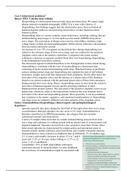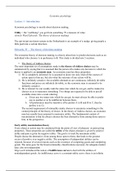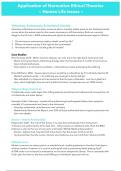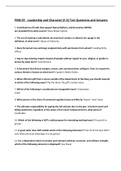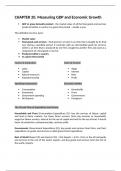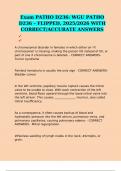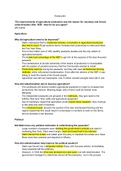Chapters 5-6, 11-21
Chap 5 – Morality and Religion
There are three central assumptions that underlie the widespread view that morality depends on
Religion:
1) Religious belief is needed to get us to do our duty.
2) Morality must be created by someone, and God is by far the best candidate for the job.
3) Religious wisdom is the key to providing us with moral guidance.
1) Religious belief is needed to get us to do our duty.
Deist = One who believe that God exists, created the universe, and then refrained from becoming
involved in human affairs
Atheism prevents us from seeing why we should be moral. Without the belief in God, people are
more likely to stray from the path of virtue. Religious people are going to be more conscientious than
atheists or agnostics. How? Fear of God and desire for a happy afterlife.
Response 1: Theists might be more conscientious but that doesn’t mean that they are more likely to
do good. Ex. Inquisition – their conscience led them to torture people.
Response 2: Imagine best scenario, conscience = do good. If fear of God is what motivated theists to
do well, then the might do the right thing BUT for the wrong reason. So if this traditional way to get
people do their duty is effective, it undermines moral character, rather than support it. The ones that
deserve our prise are the ones who do their duty for its own sake (= agnostics and atheists).
It doesn’t show that religious believes are correct nor that atheists or agnostics are unable or
unlikely to behave in morally admissible ways.
2) God is the Creator of Morality
Argument for God’s Creation of Morality:
1. Every law requires a lawmaker
2. Therefore, the moral law requires a lawmaker.
3. Humans cannot be the author of the moral law (since we are imperfect in so many ways).
4. Therefore, God is the author of the moral law.
This leads directly to The Divine Command Theory- An act is morally required just because it is
commanded by God, and immoral because God forbids it. Problems: 1) God may not command us to
do anything. 2) “Does God commands us to do actions because they are morally right, or are actions
morally right because God commands them?” Theists answer is the latter. Prior to God, morality
didn’t exist because God is the creator of everything.
So a perfect God must have had excellent reasons for laying down the moral law as he did. But then
these reasons, and not Gods commands, are what makes actions right or wrong.
The Euthyphro Argument:
1. Either God has reasons or lacks reasons for his command.
1
, 2. If God lacks reasons for his commands, then Gods commands are arbitrary- and that
renders Gods imperfect, undermining his moral authority.
3. If God has reasons for his commands, then these reasons, rather than the divine
commands, are what make actions right or wrong- thereby refuting the Divine command.
4. Therefore, either God is imperfect, or the divine command theory is false.
5. God is not imperfect
6. The Divine command Theory is false
The Divine Perfection Argument:
1. If the Divine command theory is true, God could have created a morality that forbade us
from any acts of kindness of generosity (bc according to the theory, there’s nothing
intrinsically wrong in such things)
2. A morally perfect God could not have issued such commands.
3. Therefore, the divine command theory is false.
Abandoning the divine command theory does mean giving up the view that God is the author of
morality. But this is needed in order to preserve Gods perfection. So, if God dis not the creator of
morality, the absence of God does not mean the absence of morality. Indeed, a perfect God in one
who fully understands and a embraces a moral law nt of HIS own making.
3) Religion is an Essential Source of Moral Guidance
Suppose that God exists, but is not the author of the moral law. God could still play a crucial role in
morality- not by being its inventor, but by being its infallible reporter. So « an act is morally required
if God commands it, and is immoral it God forbids it » God’s commands don’t make actions right or
wrong but his verdict is decisive. Worries:
God may exist- and yet not offer any advice to us.
We must select a source of religious wisdom among many choices.
We must know how to interpret that source.
Argument from Religious Authority:
1. If the Bible prohibits abortion, then abortion is immoral
2. The Bible prohibits abortion
3. Abortion is immoral
Different religions offer us different texts. Believers must choose among them, and justify their
choice in the face of wide number of conflicting approaches. To succeed with the divine command
there are several conditions that must be met. It must be the case that 1) God exists (by believing it)
2) God must offer us moral advice 3) theists must be justified in selecting a particular source of
religious and moral wisdom. Theists must also 4) defend specific interpretations of those sources and
religious believers must 5) successfully argue for the priority of one over the other.
Conclusion: if God exists and he issues commands on the basis of this perfect understanding, out of
love for His creatures… Does religion offer reliable moral guidance? Depends on whether we can
know which texts are divinely written, whether we can defend our favored interpretations and we
can balance these interpretations against religious tradition and authorities in cases of conflict.
2
, Chap 6 – Natural Law
1) The Theory and Attractions
Natural law theory: tells us that actions are right just because they are natural, and wrong just
because they are unnatural. And people are good or bad to the extent that they fulfill their true
nature- the more they fulfill their true nature, the better they are.
4 advantages :
1. Morality could possibly be objective. We do right when our acts express human nature,
so long as there is such a thing as human nature, there is an objective source of morality.
Human nature is the ultimate moral standard.
2. Morality is especially suited for human beings, and not for anything else in the natural
world. Humans are Moral agents- those who bear responsibility for their actions, and
who are fit for praise or blame, are those who can control their behavior through
reasoning. That’s why we don’t hold animals responsible for the harms they cause.
3. Clear account of the origins of morality. Morality is as old as humanity itself.
4. How to gain moral knowledge.
Hume’s argument (to undermine hope for moral wisdom)
1. We can know only two sorts of claims: conceptual truths (One that can be known just by
understanding it) or empirical truths (Known only by relying on evidence from our five
senses).
2. Moral claims are neither conceptual truths nor empirical truths.
3. Therefore, we can have no moral knowledge.
Moral claims are not empirical because empirical knowledge describes how the world IS, but morality
tells us how the world ought to be: how can we go from description to prescription?
NL has an answer: moral knowledge requires 2 things: know what our human nature is, and know
whether various actions fulfill it. These two kinds of knowledge are empirical. So if natural law
theorists are right, you can derive and ought from an is.
2) Three conceptions of Human Nature
But what is the nature of human nature? There are three familiar answers.
1. Human Nature as Animal Nature - We are animals by nature and we behave as other
animals do. But, the fact that we share traits, needs and interests with other animals is not
sufficient to determine our human nature - at least if that nature is supposed to also provide
moral standards that we must live by.
2. Human Nature as what is Innate - Our true nature is the one we are born with; traits we
acquire through socialization are artificial. But the ultimate origins of our impulses are
irrelevant to the morality of our actions. We know that killing people because of their skin
3





